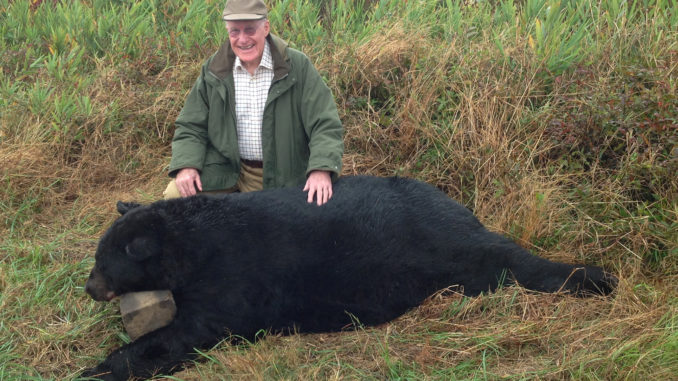
Richmond man takes 782-pound male bruin with three shots from .300 Magnum
On the morning of Nov. 11, Thomas Capps of Richmond, Va., killed a 782-pound black bear from a blind overlooking a field of soybeans and corn on private land in Hyde County. The bear is officially the largest-ever killed in North Carolina by a still-hunter and is the second-largest bear ever taken in the state.
Greg Batts, a wildlife biologist with the N.C. Wildlife Resources Commission confirmed the kill and was present when the bear was weighed on a set of certified scales in Fairfield. He said the male bear was 2 pounds heavier than the bear that was previously North Carolina’s No. 2 all-time bruin.
“He was a real brute,” Batts said.
Capps is a native of Chapel Hill who has hunted bears in eastern North Carolina for much of his life. His 782-pound monster is far bigger any of the handful of bears he has previously taken. But a fear of snakes almost kept him inside his vehicle the morning of the hunt.
“It was hot (and) muggy, and I was worried about snakes when I parked the car,” Caps said, but recent reports of lots of bear activity in the particular field was reason enough for him to head to his stand.
Shortly after daylight, Capps looked out across the field from his blind and saw movement 150 yards away.
“There he was, coming out of a thicket at 150 yards away. I raised my .300 Winchester Magnum and took a shot that immediately knocked him down, but he got up, and I put two more rounds in him and that finished him off,” Capps said.
The big bruin got a tremendous amount of nationwide attention almost immediately, because professional hunters and outdoors television show personalities Jim and Eva Shockey were bear-hunting nearby and herd about Capps’ bruin. They came to Mattamuskeet Ventures, where the bear was weighed on digital scales, saw the bear and posted photos with the bear on their Facebook pages, drawing thousands of viewers.
According to Batts, Shockey said Capps’ black bear was the biggest he’d ever seen, and he’s hunted all around the world.
According to Colleen Olfenbuttel, the Commission’s chief bear biologist, Capps’ bear was an older bruin, but not much older than 12 years of age.
“Black bears are in their prime when they are between 6 and 12 years of age. As bears get older, they actually lose weight during the late stages of their life,” she said.
Batts removed one of the bear’s teeth and said it will be sent to a Montana laboratory to determine the exact age. Olfenbuttel will use the age information to help manage black bear populations in North Carolina. Her 2013 report on black bears said North Carolina’s statewide bear population numbers approximately 20,000, and it’s continuing to grow every year.













